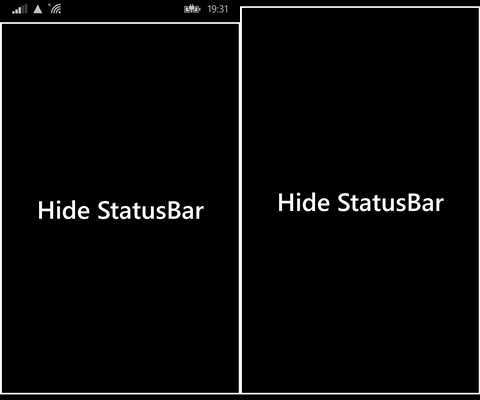Windows Phone 8.1 控件
2020-12-13 01:33
标签:des style blog class c code 如果你已经开始了 Windows Phone 8.1 的学习,就会发现许多在 8.0 下的控件在 8.1 中都发生了变化,以下就谈谈几个 8.1
下的新控件以及与 8.0 控件的改变。 1. TextBox, AutoSuggestBox TextBox 终于有了 Header 属性,再也不用为 TextBox 写一堆 TextBlock
了。 当某些控件没有 Header 属性的时候,可以将 TextBlock 的 Style 绑定为
ControlHeaderTextBlockStyle,这样就可以与 TextBox 的 Header 样式相同了。 界面为这样: AutoSuggestBox 的使用则只需绑定 ItemsSource。 XAML: C#: 界面为这样: 2. MessageDialog, ContentDialog 刚学 8.1 遇到的第一个问题就是 MessageBox 不见了,其实它只是换成了
MessageDialog。 界面: ContentDialog 则可以设置为部分或者全屏,或者直接在项目里新建一个
ContentDialog。 界面: Dialog 的显示都为异步方法。 3. Button Button.Flyout.Flyout 界面: Button.Flyout.MenuFlyout 界面: 4. BottomBar 之前的 ApplicationBar 更换成了 BottomAppBar。 界面: 5. StatusBar 之前的 SystemTray 更改为 StatusBar,并且只能通过 C# 代码控制,不能用
XAML 控制。 界面: Windows Phone 8.1 控件,搜素材,soscw.com Windows Phone 8.1 控件 标签:des style blog class c code 原文地址:http://www.cnblogs.com/xiaoshi3003/p/3739510.htmlTextBox Header="TextBoxWithHeader"/>
TextBlock Text="TextBoxWithoutHeader" Style="{StaticResource ControlHeaderTextBlockStyle}"/>
RadioButton Content="RadioButton"/>
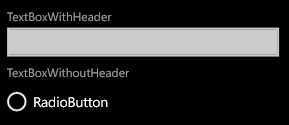

AutoSuggestBox x:Name="autoBox"
Header="AutoSuggestBox"
GotFocus="autoBox_GotFocus"
TextChanged="autoBox_TextChanged">
AutoSuggestBox.ItemTemplate>
DataTemplate>
TextBlock Text="{Binding}"/>
DataTemplate>
AutoSuggestBox.ItemTemplate>
AutoSuggestBox>


Liststring> suggestions = new Liststring>(){ "S1", "S2", "S3", "U1", "U2", "U3" };
private void autoBox_GotFocus(object sender, RoutedEventArgs e)
{
autoBox.ItemsSource = suggestions;
}
private void autoBox_TextChanged(AutoSuggestBox sender, AutoSuggestBoxTextChangedEventArgs args)
{
string filter = sender.Text.ToUpper();
autoBox.ItemsSource = suggestions.Where(s => s.ToUpper().Contains(filter));
}

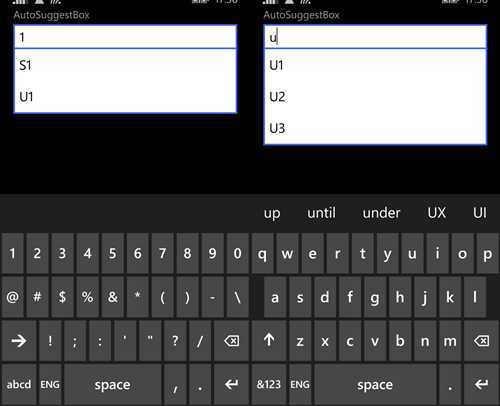
private async void messageDialogButton_Click(object sender, RoutedEventArgs e)
{
MessageDialog messageDialog = new MessageDialog("MessageBox --> MessageDialog", "MessageDialog");
await messageDialog.ShowAsync();
}


private async void partialDialogButton_Click(object sender, RoutedEventArgs e)
{
ContentDialog contentDialog = new ContentDialog();
contentDialog.FullSizeDesired = false;
contentDialog.Title = "Partial ContentDialog";
contentDialog.Content = "Partial";
await contentDialog.ShowAsync();
}
private async void fullDialogButton_Click(object sender, RoutedEventArgs e)
{
ContentDialog contentDialog = new ContentDialog();
contentDialog.FullSizeDesired = true;
contentDialog.Title = "Full ContentDialog";
contentDialog.Content = "Full";
await contentDialog.ShowAsync();
}
private async void customDialogButton_Click(object sender, RoutedEventArgs e)
{
CustomDialog customDialog = new CustomDialog();
await customDialog.ShowAsync();
}

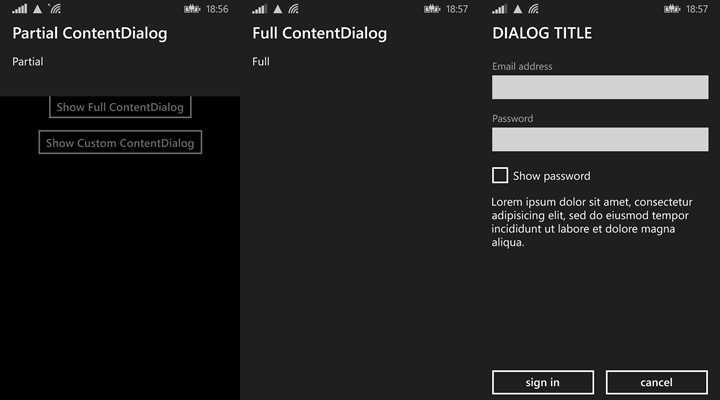

Button Content="Button.Flyout.Flyout"
HorizontalAlignment="Center">
Button.Flyout>
Flyout>
StackPanel HorizontalAlignment="Center">
TextBlock Text="Button.Flyout"
FontSize="40"/>
Button Content="OK"
HorizontalAlignment="Center"/>
StackPanel>
Flyout>
Button.Flyout>
Button>

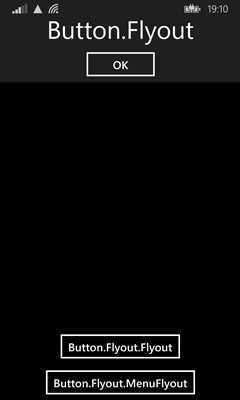

Button Content="Button.Flyout.MenuFlyout"
HorizontalAlignment="Center">
Button.Flyout>
MenuFlyout>
MenuFlyoutItem Text="MenuFlyoutItem"/>
ToggleMenuFlyoutItem Text="ToggleMenuFlyoutItem"/>
MenuFlyout>
Button.Flyout>
Button>

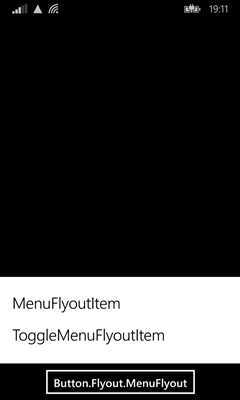

Page.BottomAppBar>
CommandBar>
CommandBar.PrimaryCommands>
AppBarButton Icon="Accept" Label="Accept"/>
AppBarButton Icon="Cancel" Label="Cancel"/>
CommandBar.PrimaryCommands>
CommandBar.SecondaryCommands>
AppBarButton Icon="Help" Label="Help"/>
CommandBar.SecondaryCommands>
CommandBar>
Page.BottomAppBar>

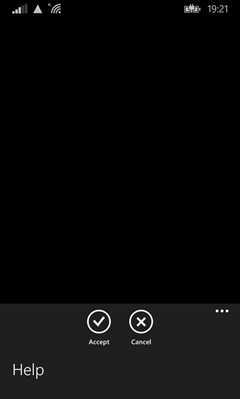

private async void Button_Click(object sender, RoutedEventArgs e)
{
Windows.UI.ViewManagement.StatusBar statusBar = Windows.UI.ViewManagement.StatusBar.GetForCurrentView();
await statusBar.HideAsync();
}

